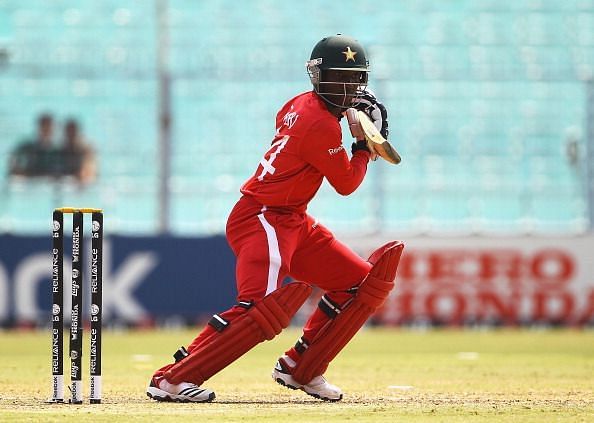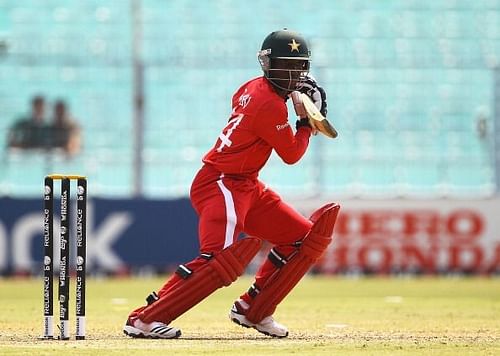
5 cricketers who retired early

For a cricketer, taking retirement from the game is the most difficult decision of their life. Recently, cricketer Gautam Gambhir, while retiring, said "The most difficult decisions are often taken with the heaviest of hearts. And with one heavy heart, I've decided to make an announcement that I've dreaded all my life,"
Generally, a cricketer retires when they feel that they've given everything that was left in the tank and now their body or their will does not allow them to continue playing the game.
Having said this, early retirements are not something new to the game. Many cricketers in the recent past have left the game early due to various reasons.
Here is a look at the five immensely talented cricketers who retired too soon.
#1 Tatenda Taibu (Zimbabwe, at 29 years of age)
Tatenda Taibu became the youngest Test captain in the history of Test cricket when he captained Zimbabwe at the age of 21. The Zimbabwean batsman announced his retirement at just the age of 29, stating that he wanted to focus on working for the church. His decision came in as a major surprise, as he was named in Zimbabwe's provisional squad for World Twenty20 just one day before he retired.
Taibu played 28 Tests and 150 one-day international matches for Zimbabwe. He also represented Kolkata Knight Riders in the IPL. Taibu's cricketing career lasted for 11 years where he became Zimbabwe's second most successful wicket-keeper batsman after Andy Flower. Taibu recently accepted a role as Zimbabwe Cricket's convenor of selectors and development officer and is currently working for the development of cricket in Zimbabwe.
#2 James Taylor (England, at 26 years of age)
James Taylor was one of the finest talents in world cricket when he was forced to retire from the game at just the age of 26. After a serious health scare at a training session, the English batsman was diagnosed with a heart condition that required him to give the game away, just as he looked set to forge a solid career for England.
The highlight of Taylor's career was his unbeaten 98* vs Australia at the MCG. He also became England's captain in 2015 for the Ireland Tour. The young batsman was able to play just seven Tests and 27 ODIs for England before he retired in 2016. James Taylor was then appointed as a national team selector in July 2018.
#4 Craig Kieswetter
England's World T20 hero and opener, Craig Kieswetter was forced to retire at the age of just 27 after he suffered serious facial injuries when he was struck by a bouncer in a match in 2014. The wicketkeeper-batsman was born and raised in South Africa. He featured for South Africa U-19 team in the ICC U19 WC 2006.
A year after the injury, Kieswetter returned to domestic cricket, but he could never recover from the eye injury and the Englishman decided to call it quits in 2015. Kieswetter was seen as one of the future captains of the England cricket team. The wicketkeeper-batsman played 46 ODIs and 26 T20 international games for England. Kieswetter has started his career as a professional golf player
#4 Zafar Ansari
England all-rounder, Zafar Ansari had just made his Test debut for England before he decided to retire from the game at just the age of 25. A slow left-arm bowler and left-hand batter, Ansari said he wanted to pursue other opportunities and was contemplating a career in law.
The left-arm spinner and middle-order batsman had studied throughout his playing career and was awarded a double first from Trinity Hall, Cambridge, in social and political sciences in 2013 and then a Masters in history from University of London. He is currently working as a professional lawyer in England.
Explaining his retirement, Ansari said: “I have always been clear that, when the time was right for me to move on, I would and that time has now come. I have always maintained that cricket was just one part of my life and that I have other ambitions that I want to fulfil.” Zafar Ansari played three Tests and one ODI for England.
#5 Beau Casson
Beau Casson, a chinaman bowler from New South Wales made his debut in Barbados. That Test remains his only appearance at the International level. As Casson went about playing cricket, it was revealed that he had a serious heart issue called Tetralogy. In 2010, he had a surgery and returned to play a few months later.
However, it became clear that his health would be in jeopardy if he continued playing. A few weeks later, he decided to retire at the age of 28. He then took up coaching role for various domestic teams.
He played 53 first-class matches for Western Australia and New South Wales, taking 123 wickets at 43.04, with a best of 6-64. In addition, he was an accomplished lower-order batsman scoring 1500 First class runs at an average of 22.38. Beau was seen as a long term successor of Australian legend, Shane Warne.